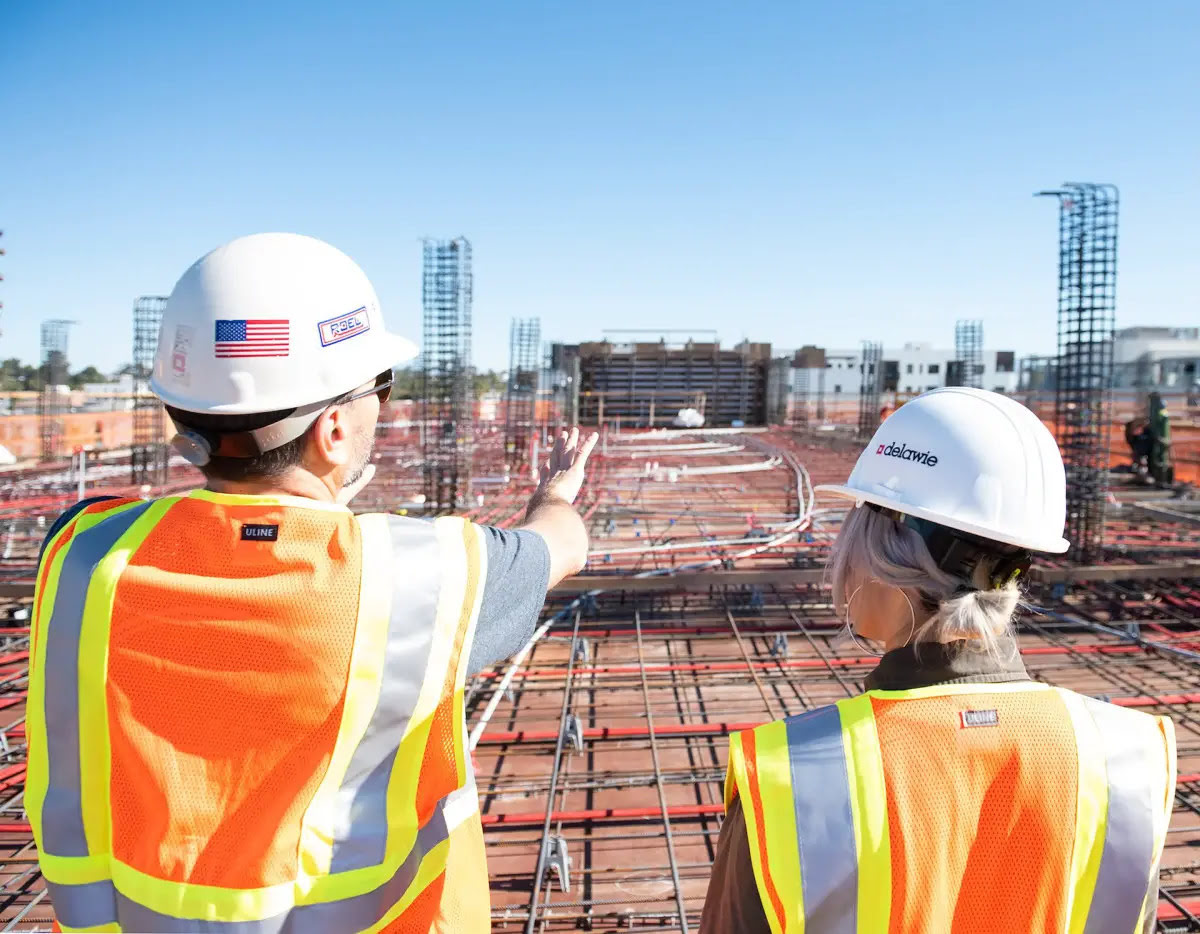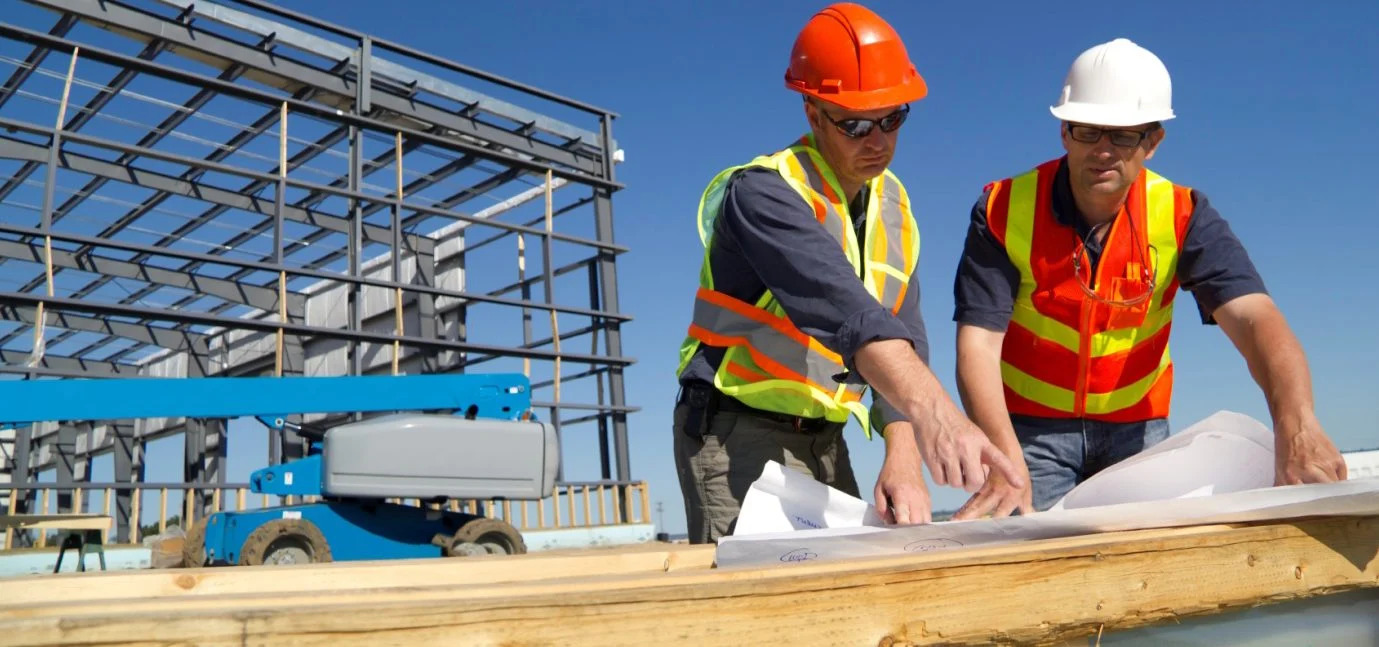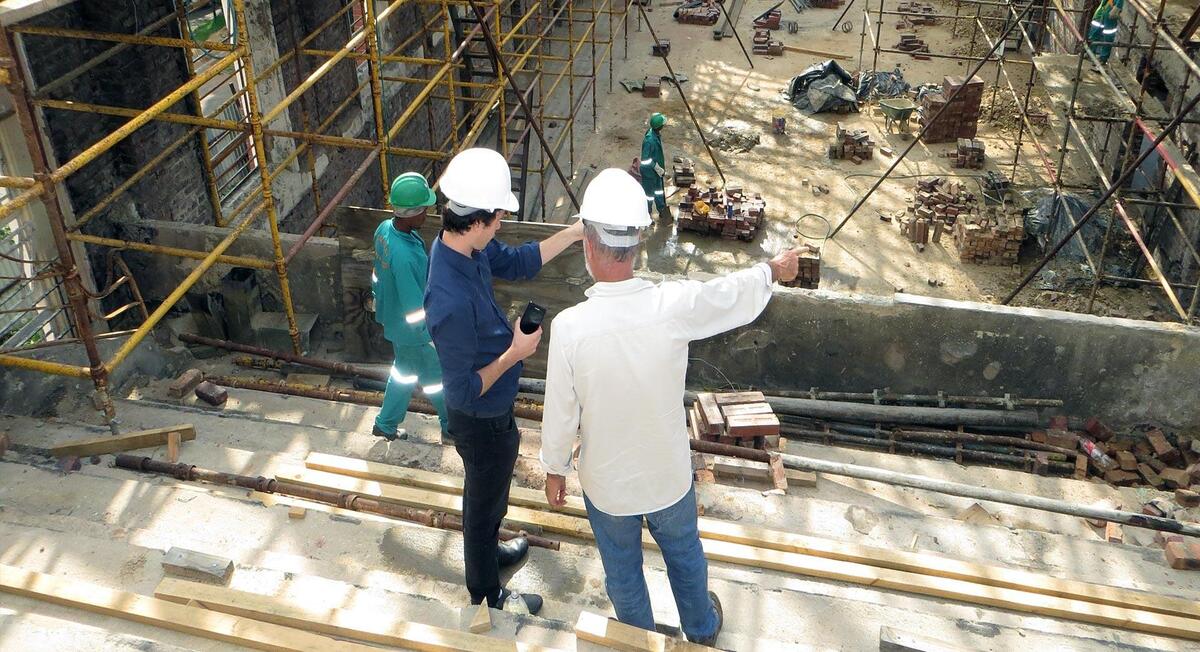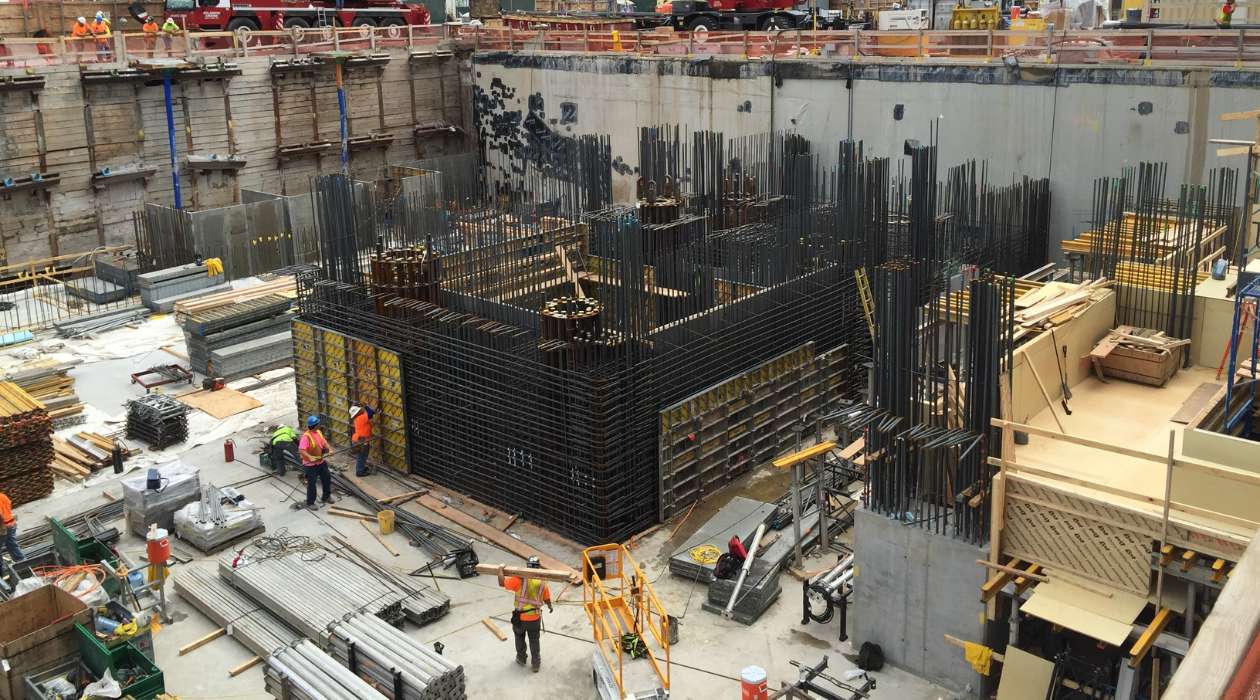Home>diy>Building & Construction>How Does A Construction Company Make Money


Building & Construction
How Does A Construction Company Make Money
Modified: January 24, 2024
Discover how building construction companies generate revenue and maximize profits through various strategies and services. Explore the key factors that contribute to a construction company's financial success.
(Many of the links in this article redirect to a specific reviewed product. Your purchase of these products through affiliate links helps to generate commission for Storables.com, at no extra cost. Learn more)
Introduction
When it comes to the construction industry, building companies not only play a crucial role in shaping our physical environment but also in generating profit. But how exactly do construction companies make money? In this article, we will delve into the various revenue streams, cost structures, and factors that affect profitability in the construction industry, as well as strategies to increase it.
Construction companies are involved in a wide array of projects, including residential, commercial, and infrastructure development. From constructing homes and office buildings to bridges and highways, there are numerous opportunities for companies to monetize their expertise and services.
However, it’s important to note that construction companies differ in terms of their specialization, scale, and business models. Some companies may focus solely on residential construction, while others may specialize in commercial or industrial projects. Additionally, there are general contractors who oversee the entire construction process and subcontractors who specialize in specific trades or tasks.
Regardless of the type of construction company, the primary revenue streams typically include:
- Project Contracts: Construction companies generate revenue by securing contracts for specific projects. They bid for projects by providing cost estimates and proposals.
- Subcontracting: In some cases, construction companies act as subcontractors, carrying out specific tasks or trades for larger construction firms.
- Consulting and Design Services: Construction companies with expertise in architecture, engineering, or project management may offer consulting and design services for a fee.
- Real Estate Development: Some construction companies invest in real estate development projects, making money through property sales or rentals.
While the revenue streams may vary, construction companies also need to carefully manage their cost structures in order to maintain profitability. The cost structure typically includes:
- Material Costs: Construction companies need to procure building materials such as cement, steel, and lumber, which can significantly impact their overall expenses.
- Labor Costs: The largest portion of a construction company’s cost structure comes from labor expenses, including wages, benefits, and insurance.
- Equipment and Machinery: Construction companies often need to invest in heavy machinery, tools, and equipment for various construction tasks.
- Overhead Expenses: This includes rent, utilities, office supplies, licensing fees, and other administrative costs necessary to run the business.
Profitability in the construction industry can be influenced by several factors, including the overall market conditions, competition, and economic cycles. During times of economic growth, construction projects tend to increase, leading to more opportunities for construction companies to generate revenue. However, during economic downturns, demand for construction projects may decline, impacting a company’s profitability.
Key Takeaways:
- Construction companies generate revenue through project contracts, subcontracting, consulting services, real estate development, and equipment rental. Managing material, labor, and overhead costs is crucial for maintaining profitability in a competitive industry.
- Factors affecting profitability in construction include market conditions, competition, labor productivity, material costs, project management, and funding. Implementing strategies such as efficient planning, strong supplier relationships, and innovative technology adoption can enhance profitability and long-term success.
Read more: How To Make Money In Construction
Types of Construction Companies
The construction industry encompasses a wide range of activities, and as a result, there are several types of construction companies that specialize in different areas. Here are some common types of construction companies:
- Residential Construction Companies: These companies focus on building and renovating residential properties such as houses, apartments, townhouses, and condominiums. They work closely with homeowners or developers to bring their vision to life.
- Commercial Construction Companies: Commercial construction companies specialize in constructing buildings for business purposes. This includes offices, retail stores, restaurants, hotels, warehouses, and industrial facilities. They often work with business owners, architects, and project managers.
- Industrial Construction Companies: Industrial construction companies are involved in the construction of large-scale industrial facilities such as power plants, factories, refineries, and manufacturing plants. These projects require specialized knowledge and expertise to meet the unique requirements of the industrial sector.
- Infrastructure Construction Companies: Infrastructure construction companies focus on building essential public infrastructure such as roads, bridges, tunnels, airports, seaports, railways, and water treatment facilities. They often work in collaboration with government agencies and engineering consultants.
- Specialty Trade Contractors: While not strictly construction companies, specialty trade contractors are a crucial part of the construction industry. They specialize in specific trades such as plumbing, electrical work, carpentry, painting, and HVAC installations. These contractors work on construction projects either independently or as subcontractors for larger construction companies.
Each type of construction company requires a different set of skills, expertise, and resources. Residential construction companies, for example, need to have an excellent understanding of residential building codes, design aesthetics, and customer preferences. On the other hand, industrial construction companies must have knowledge of heavy machinery, complex project management, and safety protocols.
It’s also worth mentioning that there can be overlap between different types of construction companies. For instance, a company may specialize in both residential and commercial construction, or a commercial construction company may also take on infrastructure projects. The specialization often depends on the company’s resources, experience, and market demand.
Furthermore, the size of construction companies can vary significantly. There are small, locally-owned businesses that specialize in niche markets, as well as large multinational corporations that take on major construction projects worldwide. The size of the company can impact its capacity to handle multiple projects simultaneously, the resources it can allocate, and the geographic scope of its operations.
Understanding the different types of construction companies is essential for both clients and industry professionals. Clients can choose a construction company that best aligns with their project requirements, while professionals can specialize in their desired field and build expertise accordingly.
Revenue Streams in Construction
Construction companies generate revenue through various channels and revenue streams. Understanding these revenue streams is essential for their financial success and growth. Here are some of the primary revenue streams in the construction industry:
- Project Contracts: The most common revenue stream for construction companies is through project contracts. These contracts involve bidding for construction projects and securing the contract upon winning the bid. Construction companies prepare cost estimates, proposals, and timelines to compete with other companies. The revenue is generated through the successful completion of the project, often in stages or milestones agreed upon in the contract.
- Subcontracting: Construction companies can also generate revenue by acting as subcontractors for larger construction firms. In these cases, they are hired to perform specific tasks or trades within a larger construction project. By subcontracting, construction companies can expand their network and workload while earning revenue from specialized tasks.
- Consulting and Design Services: Construction companies with expertise in architecture, engineering, or project management may offer consulting and design services. These services can be provided before or during the construction process and can include architectural design, structural analysis, feasibility studies, and project management consultation. Revenue is generated by charging clients for their expertise and professional services.
- Real Estate Development: Some construction companies also engage in real estate development as a revenue stream. They invest in land or existing properties, develop them, and then earn revenue through property sales or rentals. This revenue stream requires a different set of skills, as it involves not only construction but also market analysis, property management, and negotiation.
- Maintenance and Facility Management: Construction companies can also generate revenue through maintenance and facility management services. Once a construction project is completed, clients may hire the construction company to handle ongoing maintenance, repairs, and operation of the facility. This can include tasks such as HVAC system maintenance, electrical repairs, plumbing services, and general facility upkeep.
- Equipment Rental: Construction companies often own a range of heavy machinery and equipment necessary for construction projects. When these assets are not in use, companies can generate revenue by renting them out to other construction firms or individuals. Equipment rental can be a significant revenue stream, especially if the company has a large and diverse fleet of machinery.
It’s important to note that the revenue generated from these streams can vary depending on the size of the construction company, the types of projects undertaken, and the level of specialization. Some companies may focus solely on project contracts, while others may diversify their revenue streams by offering additional services.
Additionally, the revenue earned by construction companies can be either project-based or recurring, depending on the nature of the revenue stream. Project-based revenue is generated through the completion of specific construction projects, while recurring revenue streams, such as maintenance services or equipment rental, provide ongoing income.
By diversifying their revenue streams and continually seeking new opportunities, construction companies can ensure a steady flow of income and maintain financial stability even during economic downturns or fluctuations in the construction market.
Cost Structure in Construction
The construction industry is known for its complex cost structures, as there are numerous expenses involved in carrying out construction projects. Understanding and managing these costs is crucial for construction companies to ensure profitability. Here are some key components of the cost structure in construction:
- Material Costs: Construction companies need to procure a wide range of materials for their projects, including cement, steel, lumber, bricks, glass, and other building materials. These material costs can vary depending on market prices, availability, and project specifications. Efficient cost management and effective supplier relationships are essential in minimizing material costs.
- Labor Costs: Labor expenses often make up the largest portion of a construction company’s cost structure. Construction projects require skilled and unskilled workers, such as architects, engineers, project managers, construction workers, and subcontractors. Labor costs include wages, benefits, insurance, payroll taxes, and training expenses. Tracking and optimizing labor costs are crucial to ensure fair compensation, maintain productivity, and manage project budgets effectively.
- Equipment and Machinery: Construction companies need a wide range of tools, machinery, and equipment to carry out construction tasks efficiently. This includes excavators, cranes, bulldozers, concrete mixers, scaffolding, and power tools. Acquiring, maintaining, and repairing this equipment can incur significant costs. Companies must carefully plan equipment usage, schedule maintenance, and make informed investment decisions to optimize equipment costs.
- Overhead Expenses: Overhead expenses encompass various non-project-specific costs incurred in running a construction business. This includes facility rent, utilities, office supplies, insurance, licenses, permits, legal fees, marketing costs, and administrative salaries. Managing overhead expenses is important to maintain financial stability and allocate resources effectively.
- Subcontractor Costs: Construction companies often engage subcontractors to perform specialized tasks or trades within a project. Subcontractor costs need to be factored into the cost structure, including their fees, materials, and any additional labor required. Effective subcontractor management, including contract negotiations and performance monitoring, is essential to control costs and ensure quality workmanship.
- Permitting and Regulatory Expenses: Construction projects must comply with various building codes, regulations, and permits. Obtaining permits, conducting inspections, and ensuring compliance with safety standards incur additional expenses. Failure to comply with regulations can result in costly fines and legal consequences.
It’s important for construction companies to accurately estimate and manage these costs to remain competitive and profitable. Effective cost control measures include:
- Thorough Project Planning: Proper planning and design can reduce material waste and labor inefficiencies. Clear project specifications and accurate cost estimates help prevent cost overruns.
- Supplier and Subcontractor Relationships: Maintaining good relationships with suppliers and subcontractors can lead to favorable pricing, negotiate discounts, and ensure reliable delivery of materials and services.
- Equipment Management: Regular maintenance, preventive measures, and smart equipment utilization help minimize repair costs and downtime.
- Efficient Resource Allocation: Proper resource allocation, including labor assignments and equipment scheduling, ensures optimal utilization and minimizes idle time.
- Continuous Cost Monitoring: Regular cost tracking, budget analysis, and variance reports help identify and address cost overruns or potential areas of improvement.
By effectively managing the cost structure, construction companies can improve their bottom line and position themselves for long-term success in a competitive industry.
A construction company makes money by accurately estimating project costs, managing expenses, and delivering projects on time and within budget. It’s important to carefully track all costs and ensure efficient project management to maximize profits.
Factors Affecting Profitability
Profitability is a critical aspect of any construction company’s success. Several factors can influence a construction company’s profitability, and understanding these factors is vital for making informed decisions and maximizing financial outcomes. Here are some key factors that can affect the profitability of a construction company:
- Market Conditions: The state of the construction market plays a significant role in a company’s profitability. During periods of economic growth, there tends to be an increase in construction projects, leading to more opportunities for revenue generation. Conversely, during economic downturns, construction projects may decline, leading to reduced demand and potentially impacting profitability.
- Competition: Competition within the construction industry can impact a company’s profitability. A highly competitive market may lead to lower profit margins as companies compete to win contracts. It’s crucial for construction companies to differentiate themselves by showcasing their expertise, quality of work, and competitive pricing strategies.
- Labour Productivity: The productivity and efficiency of labor can have a direct impact on profitability. A skilled and motivated workforce can complete projects faster and with fewer errors, reducing labor costs and increasing profitability. Training programs, incentives, and proper resource allocation can help improve labor productivity.
- Material Costs: Fluctuations in material costs can significantly impact profitability. Rising material prices can increase project costs and reduce profit margins. Construction companies must carefully manage and negotiate material prices while ensuring the use of quality materials that meet project specifications.
- Project Management: Effective project management is critical to profitability. Poor project planning, inaccurate cost estimation, and inefficient resource allocation can lead to cost overruns, delays, and ultimately impact profitability. Skilled project managers who can effectively manage timelines, budgets, and resources are essential for maintaining profitability.
- Contractual Terms and Conditions: The terms and conditions of contracts can also impact profitability. Companies need to carefully review contracts to ensure they are fair, realistic, and provide sufficient compensation for the work performed. Unforeseen changes, penalties, or payment delays can negatively affect profitability.
- Funding and Cash Flow: Adequate funding and proper cash flow management are crucial for profitability. Construction projects often require upfront expenditures before receiving payment. Companies must carefully manage cash flow to cover expenses and ensure smooth operations without impacting profitability.
- Operational Efficiency: Efficient operations in all aspects, such as procurement, equipment utilization, and administrative processes, can contribute to profitability. Streamlining processes, reducing waste, and optimizing resource allocation help reduce costs and improve overall efficiency.
- Insurance and Risk Management: Construction projects involve inherent risks, such as accidents, property damage, and legal liabilities. Proper risk mitigation strategies and adequate insurance coverage are important for protecting profitability. Unforeseen events and inadequate risk management can lead to costly consequences.
It’s also worth noting that the impact of these factors may vary depending on the size, specialization, and geographic location of the construction company. Understanding and actively managing these factors can help construction companies adapt to changing market conditions, mitigate risks, and maintain profitability over the long term.
Strategies to Increase Profitability
To thrive in a competitive construction industry, it is crucial for companies to implement strategies that focus on increasing profitability. Here are several strategies that construction companies can adopt to enhance their bottom line:
- Efficient Project Planning: Thorough project planning is essential for maximizing profitability. Accurate cost estimations, realistic timelines, and effective resource allocation help prevent cost overruns and delays. Attention to detail during the planning phase can save both time and money during project execution.
- Strong Supplier Relationships: Building strong relationships with suppliers can result in favorable pricing, discounts, and timely delivery of materials. Regular communication, reliable partnerships, and bulk purchasing can help reduce material costs, positively impacting profitability.
- Streamlined Operations: Improving operational efficiency can significantly increase profitability. Identifying and eliminating unnecessary steps, reducing waste, and optimizing workflows can minimize costs and improve productivity. Regular evaluation and process improvement are key to achieving efficiency gains.
- Effective Risk Management: Proper risk management practices are essential for profitability. Identifying potential risks, creating contingency plans, and obtaining appropriate insurance coverage can mitigate financial losses due to accidents, delays, or unforeseen events. Proactive risk management ensures smooth project execution and protects profitability.
- Enhanced Workforce Productivity: Maximizing labor productivity can directly impact profitability. Investing in employee training, providing clear instructions, and utilizing performance incentives can motivate workers to perform at their best. A skilled and efficient workforce completes projects faster, reducing labor costs and increasing profitability.
- Innovative Construction Methods and Technology: Embracing new construction methods and technology can lead to increased efficiency and improved profitability. Advancements such as building information modeling (BIM), automated machinery, and prefabrication can accelerate project timelines, reduce material waste, and optimize resource utilization.
- Effective Cost Control: Streamlining cost control processes is vital for profitability. Regular monitoring of project costs, analyzing budget variances, and addressing cost overruns promptly can help keep projects within budget. Maintaining accurate financial records and implementing cost-saving measures across all areas of the business contribute to higher profitability.
- Diversification: Expanding service offerings or entering new markets can open doors to additional revenue streams. Diversifying the range of projects, targeting emerging sectors, or venturing into related services can help construction companies secure a steady flow of projects and increase profitability.
- Client Relationship Management: Building strong relationships with clients can lead to repeat business and referrals. Satisfied clients are more likely to provide future projects and recommend the construction company to others. Maintaining open communication, delivering quality workmanship, and exceeding client expectations can improve profitability in the long run.
- Sustainable Construction Practices: Incorporating sustainable practices not only benefits the environment but can also lead to long-term cost savings. Energy-efficient designs, use of eco-friendly materials, and resource conservation can reduce operational costs and improve profitability while demonstrating social and environmental responsibility.
Implementing these strategies requires careful planning, ongoing evaluation, and a commitment to continuous improvement. Construction companies that prioritize profitability and consistently aim to enhance their operations will be better positioned to succeed in a competitive industry.
Conclusion
Profitability is a critical measure of a construction company’s success and sustainability in the industry. By understanding the various factors that affect profitability and implementing effective strategies, construction companies can increase their chances of financial success.
From managing revenue streams and controlling costs to adapting to market conditions and enhancing operational efficiency, construction companies must navigate various challenges to optimize profitability. The ability to accurately estimate costs, secure profitable contracts, and maintain a skilled workforce is vital.
Creating strong relationships with suppliers, subcontractors, and clients is also crucial for long-term profitability. Building a reputation for delivering quality work, meeting deadlines, and exceeding client expectations can lead to repeat business, referrals, and a steady flow of revenue.
Moreover, embracing innovation, adopting new technologies, and incorporating sustainable practices can provide a competitive edge while improving efficiency and reducing costs. Efficient project planning, effective risk management, and streamlined operations contribute to better financial outcomes.
It is important for construction companies to continuously evaluate their financial performance, monitor project budgets, and make informed decisions to adapt to market trends. The ability to identify opportunities, diversify revenue streams, and optimize resource utilization further enhances profitability in an evolving industry.
In conclusion, construction companies can navigate the challenges of the industry and increase profitability by integrating these strategies and aligning their business practices with changing market dynamics. By prioritizing efficiency, quality, and customer satisfaction, construction companies can position themselves for long-term success and sustainable growth in a competitive construction market.
Frequently Asked Questions about How Does A Construction Company Make Money
Was this page helpful?
At Storables.com, we guarantee accurate and reliable information. Our content, validated by Expert Board Contributors, is crafted following stringent Editorial Policies. We're committed to providing you with well-researched, expert-backed insights for all your informational needs.















0 thoughts on “How Does A Construction Company Make Money”